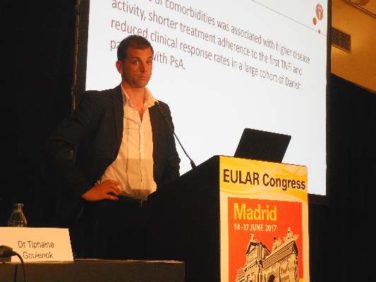FROM ARTHRITIS & RHEUMATOLOGY
The final results of a 2-year, phase III study assessing the clinical efficacy and safety of ustekinumab in 615 patients with active psoriatic arthritis confirm that joint- and skin-related improvements are maintained.
Data from the randomized, double blind, placebo-controlled PSUMMIT 1 study showed that 56.7%-63.6% of psoriatic arthritis (PsA) patients treated with a 45-mg or 90-mg dose every 12 weeks achieved American College of Rheumatology criteria for a 20% improvement in joint symptoms (ACR20). ACR50 and ACR70 responses ranged from 37.3% to 46% and 18.6% to 24.7%, respectively.
“The proportions of patients with either DAS28-CRP [28-joint Disease Activity Score using C-reactive protein] response or remission were maintained from week 52 to week 100,” noted lead study author Dr. Arthur Kavanaugh of the University of California-San Diego in La Jolla and his associates ( Arthritis Care Res. 2015 June 19 [doi:10.1002/acr.22645] ).
A moderate or good response according to DAS28-CRP was achieved by 71.9%-76.7% of patients. A 75% improvement in the Psoriasis Area and Severity Index (PASI) was achieved by 63.9%-72.5% of patients, and 41%-51.9% achieved a PASI 90. Mean changes in radiographic damage also were maintained.
“No unexpected safety events were observed through 2 years, and results were consistent with the known safety profile of ustekinumab,” Dr. Kavanaugh and his colleagues wrote, adding that the study “demonstrated a favorable benefit-risk profile of ustekinumab treatment in patients with active PsA.”
The trial was funded by Janssen Research & Development. Dr. Kavanaugh has received research support from AbbVie, Janssen, and UCB. Many of the other authors also had financial ties to Janssen and other manufacturers of biologics for psoriatic arthritis.
rhnews@frontlinemedcom.com




